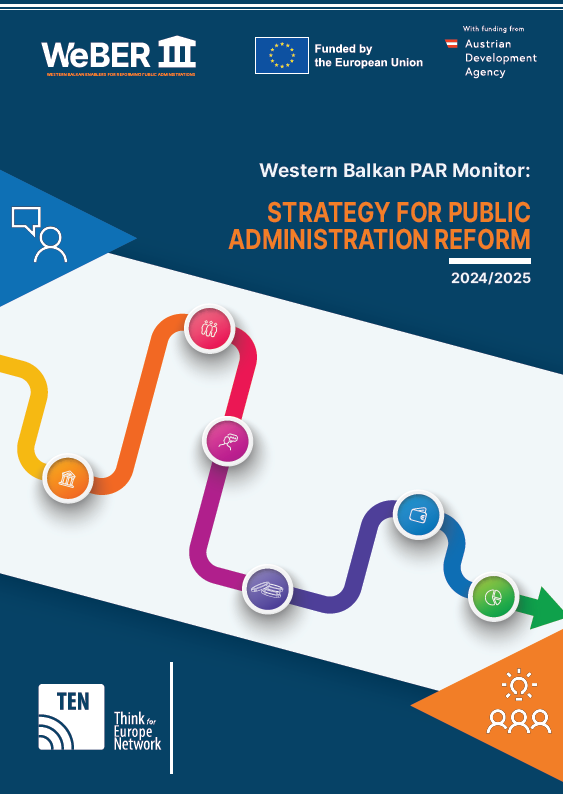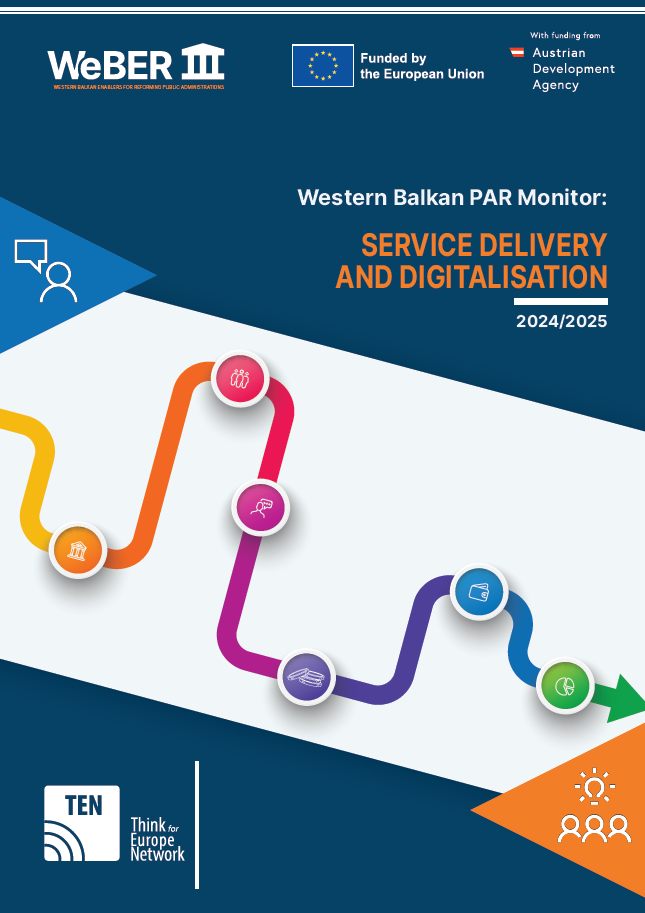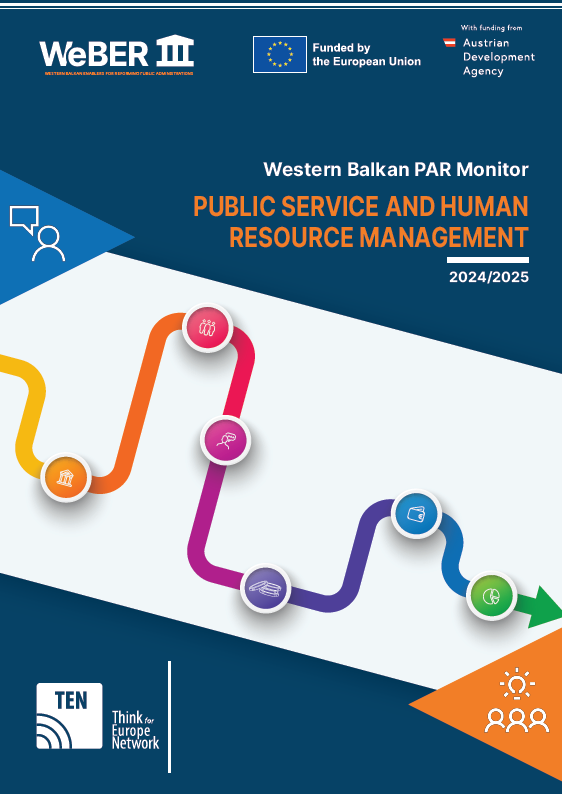PAR Monitor reports
The Public Administration Reform (PAR) Monitor methodology was firstly developed in 2015-2016, as part of the first Western Balkans Enabling Project for Civil Society Monitoring of Public Administration Reform (WeBER) project. Since the onset, WeBER has adopted a markedly evidence-based approach in its endeavour to increase the relevance, participation and capacity of civil society organisations (CSOs) in the Western Balkans to advocate for and influence the design and implementation of PAR.
The PAR Monitor is one of the main WeBER products, embodying the evidence-based civil society monitoring of PAR. In line with WeBER’s focus on the region’s EU accession process, once the SIGMA Principles of Public Administration were revised in 2023, the WeBER PAR Monitor methodology was also redesigned in 2024. This was done in order to keep the focus of WeBER’s recommendations on EU-compliant reforms, thus guiding the governments in the region towards successful EU accession and future membership.
In the latest PAR Monitor cycle (2024/2025), WeBER introduced a new reporting and publishing approach, producing one report per reform area. For each area, one regional Western Balkans report and six national reports (one for each of the six WB countries) are published. These regional reports should be read alongside the national reports, which provide detailed monitoring results and country-specific recommendations.
Governments in the Western Balkans have been implementing public administration reforms (PAR) for over a decade now, with varying degrees of success. Since 2014, PAR is acknowledged as one of the fundamental areas of reform on any country’s path to EU membership and a set of principles was prepared for the accession countries to follow and comply within this area in order to become successful EU member states.
These PAR Monitor reports, produced by the WeBER project, provide comparative results for each country in the Western Balkan region, based on an in-depth, year-long monitoring research effort focused on PAR. A comprehensive Western Balkan PAR Monitor should be read in concurrence with the six national PAR Monitor reports, laying out detailed monitoring results and recommendations for each country.
The PAR Monitor adopts the EU principles of public administration as the main building block of the entire endeavour, to allow for regional comparability, peer learning and peer pressure. This also allows WeBER to guide the administrative reforms in the direction of compliance with EU standards and requirements, supporting these countries’ transformation into future EU members. The WeBER monitoring focus rests strongly on the citizen-facing aspects of public administration, particularly examining issues of transparency, information provision to the public, citizen participation, accountability, equal opportunity and integrity.
The Western Balkan PAR Monitor is available for download here. (English)
The Albania PAR Monitor is available for download here. (English)
The Bosnia and Herzegovina PAR Monitor is available for download here. (English)
The North Macedonia PAR Monitor is available for download here. (English and Macedonian)
The Montenegro PAR Monitor is available for download here. (English and Montenegrin)
The Kosovo PAR Monitor is available for download here. (English and Albanian)
The Serbia PAR Monitor is available for download here (Serbian and English).
The PAR Monitor 2019/2020 is the result of monitoring work performed in 2020 by the members of the Think for Europe Network, and it represents a compilation report of key findings from across the Western Balkans in the six areas of PAR defined by the Principles of Public Administration (SIGMA principles). As the second systematic PAR monitoring done in the region by civil society, this report offers not only comparisons between Western Balkan (WB) administrations, but also comparison with the baseline PAR Monitor findings of the 2017/2018 monitoring cycle.
PAR Monitor reports are based on a comprehensive methodological framework designed by the WeBER research team that combines quantitative and qualitative sources of evidence. With the SIGMA principles as the building blocks of monitoring work, PAR Monitor reports are complementary to similar work by SIGMA/OECD and the European Commission, differing in that they offer citizen and civil society perspectives on these principles. Together with this comparative regional report, the PAR Monitor package consists of six national reports, each including findings on a total of 23 compound indicators to monitor a selection of SIGMA Principles.
In line with the mission of the WeBER initiative, these monitoring exercises are driven by the necessity to strengthen domestic, bottom-up pressure for PAR from civil society in the region, especially from the view of keeping demand for this reform ongoing in the event of the loosening of the EU’s conditionality which may come with membership in the Union.
The Western Balkan PAR Monitor is available for download here. (English)
The National PAR Monitor North Macedonia is available for download here: English | Macedonian
The National PAR Monitor Montenegro is available for download here: English | Montenegrin
Summary results of the PAR Monitor indicators are given below. Choose between different PAR areas and select results for any of the Western Balkan countries.
If you are interested to learn more details on the calculation of indicators and their results, please contact WeBER partners in each country.
Principle 1, Indicator 1: Use of participatory approaches in the development of key strategic PAR documents.
- Serbia
- Montenegro
- Albania
- Bosnia and Herzegovina
- Kosovo
- North Macedonia
Principle 2, Indicator 1: Civil society involvement in the PAR monitoring and coordination structures
- Serbia
- Montenegro
- Albania
- Bosnia and Herzegovina
- Kosovo
- North Macedonia
Principle 5, Indicator 1: Public availability of information on Government performance.
Principle 5, Indicator 2: Civil society perception of the Government’s pursuit and achievement of its planned objectives.
- Serbia
- Montenegro
- Albania
- Bosnia and Herzegovina
- Kosovo
- North Macedonia
Principle 6, Indicator 1: Transparency of the Government’s decision-making
- Serbia
- Montenegro
- Albania
- Bosnia and Herzegovina
- Kosovo
- North Macedonia
Principle 10, Indicator 1: Use of evidence created by think tanks, independent institutes and other CSOs in policy development
- Serbia
- Montenegro
- Albania
- Bosnia and Herzegovina
- Kosovo
- North Macedonia
Principle 11, Indicator 1: Civil society perception of inclusiveness and openness of policymaking
- Serbia
- Montenegro
- Albania
- Bosnia and Herzegovina
- Kosovo
- North Macedonia
Principle 12, Indicator 1: Perception of availability and accessibility of legislation and related explanatory materials by the civil society
- Serbia
- Montenegro
- Albania
- Bosnia and Herzegovina
- Kosovo
- North Macedonia
Principle 2, Indicator 1: Public availability of official data and reports about the civil service and employees in central state administration
- Serbia
- Montenegro
- Albania
- Bosnia and Herzegovina
- Kosovo
- North Macedonia
Principle 2, Indicator 2: Performance of tasks characteristic for civil service outside of the civil service merit-based regime
- Serbia
- Montenegro
- Albania
- Bosnia and Herzegovina
- Kosovo
- North Macedonia
Principle 3, Indicator 1: Openness, transparency and fairness of recruitment into the civil service
- Serbia
- Montenegro
- Albania
- Bosnia and Herzegovina
- Kosovo
- North Macedonia
Principle 4, Indicator 1: Effective protection of senior civil servants’ positions from unwanted political interference
- Serbia
- Montenegro
- Albania
- Bosnia and Herzegovina
- Kosovo
- North Macedonia
Principle 5, Indicator 1: Transparency, clarity and public availability of information on the civil service remuneration system
- Serbia
- Montenegro
- Albania
- Bosnia and Herzegovina
- Kosovo
- North Macedonia
Principle 7, Indicator 1: Effectiveness of measures for the promotion of integrity and prevention of corruption in the civil service
- Serbia
- Montenegro
- Albania
- Bosnia and Herzegovina
- Kosovo
- North Macedonia
Principle 2, Indicator 1: Civil society perception of the quality of legislation and practice of access to public information
- Serbia
- Montenegro
- Albania
- Bosnia and Herzegovina
- Kosovo
- North Macedonia
Principle 2, Indicator 2: Proactive informing of the public by public authorities
Principle 1, Indicator 1: Public perception of state administration’s citizen orientation
- Serbia
- Montenegro
- Albania
- Bosnia and Herzegovina
- Kosovo
- North Macedonia
Principle 3, Indicator 1: Public perception and availability of information on citizens’ feedback regarding the quality of administrative services
- Serbia
- Montenegro
- Albania
- Bosnia and Herzegovina
- Kosovo
- North Macedonia
Principle 4, Indicator 1: CSOs’ perception of accessibility of administrative services
- Serbia
- Montenegro
- Albania
- Bosnia and Herzegovina
- Kosovo
- North Macedonia
Principle 4, Indicator 2: Availability of information regarding the provision of administrative services on the websites of service providers
- Serbia
- Montenegro
- Albania
- Bosnia and Herzegovina
- Kosovo
- North Macedonia
Principle 5, Indicator 1: Transparency and accessibility of budgetary documents
- Serbia
- Montenegro
- Albania
- Bosnia and Herzegovina
- Kosovo
- North Macedonia
Principle 6&8, Indicator 1: Public availability of information on public internal financial controls and the parliamentary scrutiny
- Serbia
- Montenegro
- Albania
- Bosnia and Herzegovina
- Kosovo
- North Macedonia
Principle 11&13, Indicator 1: Availability of public procurement related information to the public
- Serbia
- Montenegro
- Albania
- Bosnia and Herzegovina
- Kosovo
- North Macedonia
Principle 16, Indicator 1: Supreme Audit Institution’s communication and cooperation with the public pertaining to its work
- Serbia
- Montenegro
- Albania
- Bosnia and Herzegovina
- Kosovo
- North Macedonia
Governments in the Western Balkans have been implementing public administration reforms (PAR) for over a decade now, with varying degrees of success. Since 2014, PAR is acknowledged as one of the fundamental areas of reform on any country’s path to EU membership and a set of principles was prepared for the accession countries to follow and comply within this area in order to become successful EU member states.
These PAR Monitor reports, produced by the WeBER project, provide comparative results for each country in the Western Balkan region, based on an in-depth, year-long monitoring research effort focused on PAR. A comprehensive Western Balkan PAR Monitor should be read in concurrence with the six national PAR Monitor reports, laying out detailed monitoring results and recommendations for each country.
The PAR Monitor adopts the EU principles of public administration as the main building block of the entire endeavour, to allow for regional comparability, peer learning and peer pressure. This also allows WeBER to guide the administrative reforms in the direction of compliance with EU standards and requirements, supporting these countries’ transformation into future EU members. The WeBER monitoring focus rests strongly on the citizen-facing aspects of public administration, particularly examining issues of transparency, information provision to the public, citizen participation, accountability, equal opportunity and integrity.
The Western Balkan PAR Monitor is available for download here. (English)
The National PAR Monitor Albania is available for download here. (English)
The National PAR Monitor Albania is available for download here. (Albanian)
The National PAR Monitor Bosnia and Herzegovina is available for download here. (English)
The National PAR Monitor Bosnia and Herzegovina is available for download here. (Bosnian)
The National PAR Monitor Macedonia is available for download here. (English)
The National PAR Monitor Montenegro is available for download here. (English)
The National PAR Monitor Montenegro is available for download here. (Montenegrin)
The National PAR Monitor Kosovo is available for download here. (English)
Summary results of the PAR Monitor indicators are given below. Choose between different PAR areas and select results for any of the Western Balkan countries.
If you are interested to learn more details on the calculation of indicators and their results, please contact WeBER partners in each country.
Strategic Framework of Public Administration Reform
Principle 1, Indicator 1: Use of participatory approaches in the development of key strategic PAR documents.
Principle 5, Indicator 1: Public availability of information on Government performance.
Principle 5, Indicator 1: Public availability of information on Government performance.
Principle 5, Indicator 2: Civil society perception of the Government’s pursuit and achievement of its planned objectives.
Principle 6, Indicator 1: Transparency of the Government’s decision-making
Principle 10, Indicator 1: Use of evidence created by think tanks, independent institutes and other CSOs in policy development
Principle 11, Indicator 1: Civil society perception of inclusiveness and openness of policymaking
Principle 12, Indicator 1: Perception of availability and accessibility of legislation and related explanatory materials by the civil society
Principle 2, Indicator 1: Public availability of official data and reports about the civil service and employees in central state administration
Principle 2, Indicator 2: Performance of tasks characteristic for civil service outside of the civil service merit-based regime
Principle 3, Indicator 1: Openness, transparency and fairness of recruitment into the civil service
Principle 4, Indicator 1: Effective protection of senior civil servants’ positions from unwanted political interference
Principle 5, Indicator 1: Transparency, clarity and public availability of information on the civil service remuneration system
Principle 7, Indicator 1: Effectiveness of measures for the promotion of integrity and prevention of corruption in the civil service
Principle 2, Indicator 1: Civil society perception of the quality of legislation and practice of access to public information
Principle 2, Indicator 2: Proactive informing of the public by public authorities
Principle 1, Indicator 1: Public perception of state administration’s citizen orientation
Principle 3, Indicator 1: Public perception and availability of information on citizens’ feedback regarding the quality of administrative services
Principle 4, Indicator 1: CSOs’ perception of accessibility of administrative services
Principle 4, Indicator 2: Availability of information regarding the provision of administrative services on the websites of service providers
Principle 5, Indicator 1: Transparency and accessibility of budgetary documents
Principle 6&8, Indicator 1: Public availability of information on public internal financial controls and the parliamentary scrutiny
Principle 16, Indicator 1: Supreme Audit Institution’s communication and cooperation with the public pertaining to its work










